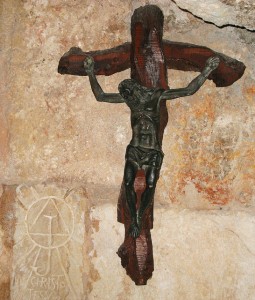One day the girl I loved called me up—out of the blue—and said, “We could really use some help out here. We’re short-staffed.” She lived and worked in Phoenix at a Catholic Worker house that served homeless people.
So I hopped on the first plane from my parents’ house in Northeastern Ohio to the edge of the Sonoran Desert, to a city I’d never visited before, in a state I’d never even seen. Into the heart of a subset of humanity I’d only ever glimpsed from behind the sneeze guard of the soup kitchen where I’d once served a meal at my parents’ church.
I wasn’t even Catholic. But I was in love.
The Girl—not this specific girl in Phoenix, but the fact that there was a girl at all in the first place, The Girl as an ideal, a Beauty-To-Win—coupled with the call of the untraveled road rolling out for miles before me jived with my notion of the Christian life at the time. A grand quest. An adventure for heroes.
I thought of myself, whether I would have acknowledged it or not, as a nascent hero. What I was wholly unprepared for, jetting off to save the day with a beautiful girl by my side, was the experience of the suffering of others. I had absolutely no concept of it, and certainly had no concept of how one’s response to suffering might just be a signpost at the place one really stands on the road of the Christian life.
Of course I’d never really suffered. Couldn’t most, if not all, suffering be alleviated by some relatively simple bootstrap tugging?
On the wall in the main dining room at the Catholic Worker was a huge, bloody crucifix. In living color. Red paint in streaks and drips from Christ’s head and hands, feet and side. Why hang that in the dining room of all places? “Because,” Fr. Brent, one of the other workers explained to me, “our guests need a Christ who suffers. How else will they know our Lord identifies with them?”
I hadn’t thought about that. The Christ I knew was a rock ’n roll version of Iron John, a deity who called boys into the wilderness and returned them to the real world as fully actualized men. Fr. Brent, by the way, was a member of the Congregation of Holy Cross whose motto is Ave Crux, spes unica.
Hail the Cross, our only hope.
Cut to the present. It’s been fourteen years since my time at the Catholic Worker. It’s been over ten years since I’ve even talked to the girl who got me out there. In fact, I’m happily married to somebody else and we have two beautiful daughters. I direct a shelter for homeless families in Chattanooga, Tennessee and I ruminate over suffering all the time. Just when I think I understand it, how deep it goes and all of its curves and edges, I’m walloped by some new iteration of it.
Last Thursday, a man came in to the shelter with his four-year-old daughter. My staff explained the intake process, including the part about how we run background checks because of the kids who stay there. The man was probably in his mid-forties, a white guy with red hair and a scraggly beard. The corners of his mouth were pulled down so that the tendons in his neck stuck out. The girl, with a pudgy round face and a bowl cut with bangs straight across her eyebrows stuck close to the man.
My staff took his ID and ran the background check. A few minutes later, with a stunned expression on her face, she handed me what she’d come up with: nine pages worth of sexual offenses, including sexual violence and the rape of a child. We told them to leave immediately. The shelter has big front windows and we watched them walk away, he not holding the girl’s hand so much as gripping it and tugging her along.
I heard my staff say, “We should call the police. What if he’s dangerous?” While she called, I walked out after him, followed him into the day center and at first couldn’t find him. I looked around at all the faces of the homeless, the baggy skin, cracked lips and sunken eyes. People wearing skin that appeared to be hundreds of years older than it actually was.
Then, there he was, turning a corner and heading toward the bathrooms. I grabbed another staff member and pointed. “Watch that guy,” I said, and ducked outside to flag down the police.
They asked him all kinds of questions. He stood with his back to the wall. He was just waiting, he said, for his little girl who was in the bathroom. Then he started to cry, the kind of crying where the tears well up but don’t fall and the voice cracks mid-sentence. He was begging, in so many words, for a break, for normalcy, for dignity.
I stood there side by side with the cops and swallowed the bitter realization that this side of heaven there’d be no breaks for this man. Life could never be normal. As long as guys like me—with the cops in tow—ran after guys like him, there could be no dignity.
The man certainly already knew that. Had probably already known it for years, maybe decades. It was the worst kind of suffering I could imagine: wanting something as simple as a normal life but at the same time being conscious it would never, could never come to pass. What to do?
The opposite of a hero is somebody with no answers. The longer I spend in the homeless services business the fewer answers I have. The adequateness of my responses to the pain others feel seems to diminish sometimes on a daily basis.
Giving resources to those who suffer as greatly as those who stay on the streets is like throwing light into a black hole. The light I provide in the form of those resources is opposite to the darkness, true, but the power of that darkness is overwhelming.
So when I view it that way, suffering cleans me out. It’s spiritual bleach. Every kneejerk consolation, every assumption and presumption of others’ pain and need and my ability to allay and provide dissolves entirely.
There I am, weak and scared, a Superman in a quarry of Kryptonite, dragging myself in the same direction as the homeless clients I see every day, staggering toward Calvary.
Ave Crux, spes unica. Hail the Cross, our only hope.
Paul Luikart’s work has appeared in Barrelhouse, Hobart and Yalobusha Review among others. He has been nominated for a Pushcart Prize and for Queen’s Ferry Press Best Small Fiction anthology. He received an MFA from Seattle Pacific University. He and his family just moved to Chattanooga, Tennessee from Chicago.
Photo taken by paweesit, used under the Creative Commons License.












